|
|
|
| |
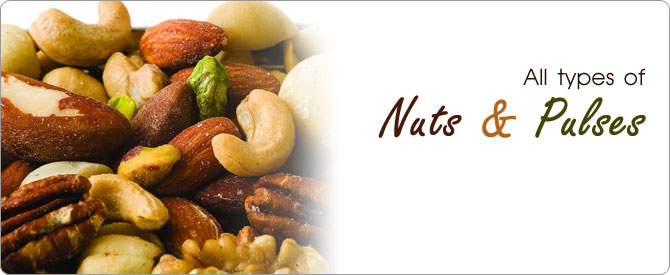 |
| |
| |
| |
|
Brazil nuts |
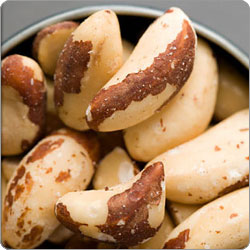 |
|
|
| ( (205 calories, 20g fat) |
| |
Although just two Brazil nuts provide about 90 calories, the caloric equivalent of an egg, this nut is also a heavyweight when it comes to nutritional value.
In addition to being loaded with healthy polyunsaturated fatty acids, of all the different types of nuts, Brazil nuts are the richest and most reliable food source of selenium.
Just one Brazil nut can provide more than the daily recommended value of this important trace mineral, which has been shown to lower the risk of heart disease and cancer, and also plays a role in reducing allergies and inflammation.
They are also a great source of magnesium, which is vital for healthy nerves and muscles and may help relieve PMS. |
| more info.., |
|
|
|
|
|
| |
|
Peanuts |
 |
|
|
| (175.5 calories, 14.9g fat) |
| |
Peanut is not really a nut but a legume or bean, but it's been consumed as a nut and that's why it's in this list.
Peanuts are high in protein, monounsaturated fat and the antioxidant resveratrol, which makes them excellent at protecting the heart and blood vessels.
In one study, subjects who consumed a diet that emphasized peanuts, in both nut and butter form, for one month demonstrated that their risk of heart disease dropped by 21% compared to those people who ate typical American/Western diet.
In another study, subjects who were given two or three servings of peanuts or peanut butter, had a reduction in both their LDL cholesterol and triglycerides levels. Those who ate peanut foods had results double the benefits of other subjects who had a low-fat diet. |
| more info.., |
|
|
|
|
|
| |
|
| Almonds |
 |
| |
|
|
| (184 calories, 16.8g fat) |
| |
Amongst the different types of nuts, almonds are a great choice for keeping your bones healthy - one ounce/30 gram provide 9% of the recommended amount for calcium and 27% for magnesium.
They are also a good source of zinc and very rich in vitamin E. Choose plain over roasted for maximum delivery of vitamin E.
In addition to their beneficial effects on lowering cholesterol and heart disease, almonds may help fight many cancers.
This may be due to the many antioxidants flavonoids as well as amygdalin, which is better known as laetrile. Of all the different types of nuts, laetrile is very rich in what's called 'bitter almond', which really is the apricot kernel.
In an animal study of the effect of almonds on colon cancer, animal were exposed to colon cancer-causing agent and fed almond meal, almond oil, whole almonds or a control diet containing no almonds.
The animals given whole almonds showed fewer signs of colon cancer, including fewer rapidly dividing cells.
The almond's high fibre content - just 1/4 cup of almonds contain 4 grams of fibre - may have something to do with it |
| more info.., |
|
|
|
|
|
| |
|
Cashew nuts |
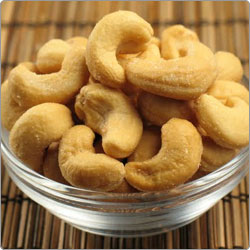 |
|
|
| (183 calories, 15.3g fat) |
| |
Cashews contain more iron per gram than lean rump steak. And if you want to increase the absorption rate of iron, eat them with a glass of orange juice, as the vitamin C in the juice significantly improves its absorption. They also provide lots of zinc and potassium.
Cashew nuts have a lower fat content and a higher protein and carbohydrate content than other types of nuts.
The fat that they do contain is mostly (65%) derived from oleic acid, a monounsaturated oil with known benefits in protecting against heart disease and cancer. |
| more info.., |
|
|
|
|
|
| |
|
Chestnuts |
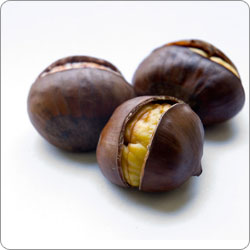 |
|
|
| (51 calories, 0.8g fat) |
| |
Chestnuts are the only low-fat nuts, with a fraction of the calories of other types of nuts. They contain just 1 gram of fat and a little less than 70 calories per 30 grams of dried or roasted nuts.
The downside is they're lower in vitamins and minerals. But they're still relatively nutritious and provide some carbohydrate.
They radically increase their caloric intake once they're boiled.
Of all the different types of nuts, chestnuts are the only nuts that contain vitamin C. Just 100 grams of chestnuts supply 45% of the RDA of this vital antioxidant nutrient. |
| more info.., |
|
|
|
|
|
| |
|
Coconuts |
 |
| |
|
|
| (100 calories, 10g fat) |
| |
Like most types of nuts, coconuts contain significant amounts of fat, but unlike other nuts, which contain mostly long-chain polyunsaturated fatty acids, coconuts provide fat that is almost all in the form of health-promoting short and medium-chain saturated fats, which are different from the saturated fats in animal products.
Being shorter in length, these fatty acids are processed differently by the body and are preferentially sent to the liver to be burned as energy.
In fact, these fats actually have been shown to promote weight loss by increasing the burning of calories (thermogenesis). Some researchers suggest that they lower cholesterol as well.
It's a shame that coconut oil continues to have a bad reputation as an unhealthy saturated fat.
Approximately 50% of the significant amount of fatty acids provided by coconut is the health promoting lauric acid, a medium-chain saturated fat, whose only other abundant source in nature is human breast milk.
In the body, lauric acid is converted into a highly beneficial compoud called monolaurin, which has been shown to destroy a wide variety of disease-causing organisms, such as Cytomegalovirus, herpes simplex 1, measles, Staphylococcus aureus, Helicobacteri pylory, Candida albicans and many more.
The antiviral properties of the medium-chain fatty acids abundant in coconut have been found to be so potent that they are now being investigated as a treatment for AIDS patients.
|
| more info.., |
|
|
|
|
|
| |
|
Hazelnuts |
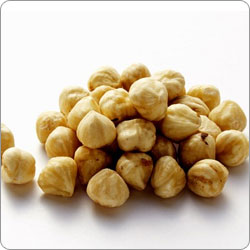 |
|
|
| (195 calories, 19.2g fat) |
| |
Hazelnuts are another rich source of vitamin E and monounsaturates. Also a very good source of the B vitamin biotin, which promotes healthy skin and hair.
Like other types of nuts, hazelnuts lower high cholesterol.
One reasons for this - besides hazelnuts' high levels of monounsaturated fats - may be their exceptional concentration of copper, a key component in the intracellular form of an important antioxidant enzyme called superoxide dismutase, which disarms free radicals that would otherwise damage cholesterol and other lipids (fats). Just 30 grams of hazelnuts supplies 41% of the daily recommended intake. |
| more info.., |
|
|
|
|
|
| |
|
Macadamia nuts |
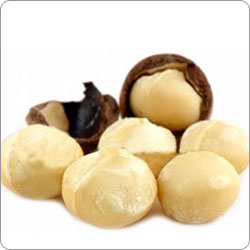 |
| |
|
|
| (224 calories, 23.3g fat) |
| |
Of all the different types of nuts, macadamias are the fattiest (that's why they taste so wonderful!), although a large proportion of this is the healthy monounsaturated variety. Just go easy if you're watching your weight.
These nuts are also rich in manganese, which plays a role in sex-hormones formation and protecting cells from free-radical damage.
Like other nuts, they're very good at lowering high cholesterol and triglycerides.
Macadamia nut oil also provide significant health benefits. While olive oil and rapeseed oil are by far the most popular monounsaturated fats in use, macadamia nut oil is superior to cook with because of its lower level of polyunsaturated fat (3% for macadamia nuts versus 8% for olive oil and 23% for rapeseed oil).
As a result, while olive oil and rapeseed oil can form lipid peroxides at relatively low cooking temperatures, macadamia nut oil is stable at much higher temperatures (over two times more stable than olive oil and four times more stable than rapeseed).
Macadamia oil, like olive oil, is also very high in natural antioxidants. In fact, it contains more than four and a half times the amount of vitamin E as olive oil. |
| more info.., |
|
|
|
|
|
| |
|
Pecan nuts |
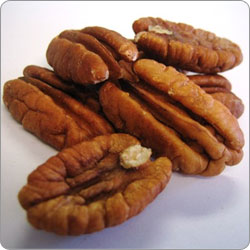 |
| |
|
|
| (207 calories, 21g fat) |
| |
The pecan is a delicious nut that, like other types of nuts, owes much of its flavour to its high fat content, most of it in the form of heart-healthy monounsaturated oleic acid.
Although this translates to a high calorie count, the pecan's endowment of macro- and micro-nutrients justifies its caloric price tag.
Pecans' concentration of monounsaturated fat and beta-sitosterol are two potential reasons why, in a study recently conducted at New Mexico State University, pecans significantly lowered LDL cholesterol.
Despite the fact that, each day, the subjects in the pecan treatment group consumed about 100 grams of pecans, which delivered 459 calories and 44 grams of fat, their body mass index and weight remained unchanged.
This shows that the healthy fats in pecans do not translate into unhealthy excess fat stores in human beings. One reason may be that pecans add richness, palatability and make you fill fuller for longer - three factors that can help stick to a heart-healthy way of eating.
Pecans contain both the alpha- and gamma-tocopherol forms of vitamin E and they remain unchanged regardless of the year, variety of pecan or region where it's grown. |
| more info.., |
|
|
|
|
|
| |
|
Pine nuts |
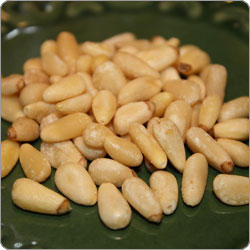 |
|
|
| (207 calories, 21g fat) |
| |
Pine nuts are higher in fat and calories than other types of nuts, but are a good source of blood pressure-regulating potassium, iron, copper and zinc and contain more protein than any other nut or seed.
They also contain magnesium and potassium, two minerals whose combined effects produce a strong, healthy heartbeat, lower blood pressure and improve blood flow.
Taken altogether, pine nut's arginine, monounsaturated fat, and magnesium and potassium content provide powerful effects for counteracting heart disease. |
| more info.., |
|
|
|
|
|
| |
|
Pistachio nuts |
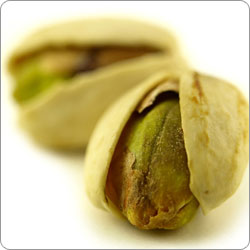 |
| |
|
|
| (183 calories, 15.3 fat) |
| |
Like other types of nuts, pistachios provide valuable amounts of minerals including calcium, iron, magnesium and zinc.
They are the richest source of potassium of all nuts - just 1 ounce/28 grams deliver as much potassium as an orange and 2 ounces/56 grams provide more potassium than a medium-size banana. Both magnesium and potassium are protective against heart disease.
They are also an excellent source of protein and fibre. A single once (28g) of roasted pistachio nuts deliver 13% of the recommended daily intake of protein and 12% of the recommended daily amount of fibre. And you get an amazing 47 nuts in one ounce!
Two recent studies show that including pistachios regularly in your diet significantly reduces LDL cholesterol and increase HDL cholesterol.
They also contain a compound, oleanolic acid, with anti-inflammatory effects.
Pistachios protect the liver from the damaging effects of three liver enzymes - alkaline phosphatase, alanine aminotreansferase and aspartate aminotransferase - along with reducing bilirubin levels. (Bilirubin is a yellowish pigment in bile whose accumulation is a primary symptom of jaundice.) |
| more info.., |
|
|
|
|
|
| |
|
Walnuts |
 |
| |
|
|
| (206 calories, 21g fat) |
| |
Of all the different types of nuts, walnuts are unusual as they contain polyunsaturated fatty acids of both the omega-3 and omega-6 families, as well as monounsaturated fats, but no cholesterol.
Omega-3 are generally lacking in our diets and can help reduce risk of heart disease by improving blood flow around the arteries. Walnuts are the main "non-fish" source of alpha-linolenic acid, which gets transformed into omega-3 fatty acids in our bodies.
Walnuts are also rich in antioxidants, in particular ellagic acid, which can stop the metabolic pathways that can lead to cancer and heart disease.
It does so by protecting healthy cells from free-radical damage, helping to detoxify potential cancer-causing substances, and preventing cancer cells from multiplying.
Walnuts also contain high levels of serotonin, one of the brain chemicals sometimes implicated in migraine. Further, walnut contains a dozen different pain-relieving compounds. |
| more info.., |
|
|
|
|
|
| |
|
|